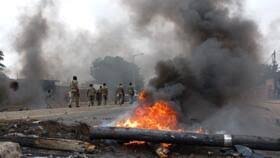
More than 1.5 million pilgrims from across the world, including over 65,000 Nigerian pilgrims, have converged on Mount Arafat, also known as Jabal Rahma, Mount of Mercy, as part of Hajj rites.
They are to take their stand (wuquf) of faith before Allah, entreating their Creator for His mercies and forgiveness.
This lifetime spiritual journey started on Friday with the Taraddudiyyah, that is the moving out from the holy city of Makkah to the holy site of Mina, the Tent City, from where the pilgrims move will to other holy sites, including Mount Arafat to perform the five-day Hajj rites.
Today holds a unique spiritual significance for not only the pilgrims but also the entire Muslim world, extending beyond the pilgrimage as it is used by Muslims worldwide to deeply engage in spiritual activities, including fasting by nonpilgrims.
The day is regarded by the Muslim world as a day of profound spiritual significance, full of mercy and forgiveness.
For the pilgrims, standing at Mount Arafat, which is about five kilometers east of the Ka’abah, the Grand Mosques (Masjid Haram) in Makkah, is considered the peak of the holy pilgrimage.
Mount Arafat is where Holy Prophet Muhammad delivered his last sermon, which has come to be known as the Farewell Sermon.
The day serves as a reminder for the pilgrims, and the Muslim ummah across the world, of the unity of Islam, equality of mankind, humility and shared spirituality.
Donning their white seamless dress known as Ihram, the pilgrims are expected to stay within the vast plains of Arafat from sunrise, engaging in acts of worship, including seeking forgiveness and making supplications for their worldly affairs and hereafter. They are also to listen to sermon at the Masjid Namirah, located within the precinct of Arafat before they move to Muzdalifah in the evening, where they will pass the night. There is no Hajj for any pilgrim unable to stand at Arafat.
The National Hajj Commission of Nigeria (NAHCON) has assured that adequate preparations have been made for Nigerian pilgrims to have a successful Hajj exercise.
NAHCON Commissioner in charge of Operations, Prince Anofiu Elegushin gave the assurance during pre-Arafat visit to the Masha’ir, the holy sites.
According to him, the most important thing to do is to continue with the sensitization of pilgrims on what they ought to do and avoud.
“The most important thing is the sensitization of our pilgrims. We need to sensitize them on all the do’s and don’t, most especially on the issue of Jamrat. It has been grouped and no one should go before their group.
“Proper sensitization of our pilgrims is very key. Pilgrims believe that it is compulsory to climb that mountain (Mount Arafat) on that day (Day of Arafat). Some will even say their Ustaz or whatever told them that on the Day of Arafat, if you are not able to get there, that’s means you don’t have Hajj.”
He assured that the Hajj commission in collaboration with the various state boards is ready for the 2024 Hajj, saying that, “be rest assured that we are covered in the name of Allah and also covered by the efforts of our people on ground.”
In view of the predicted high temperatures expected during the Hajj, the commission has admonished Nigerian pilgrims to drink lots of water, avoid direct contact with the scorching sun and stay mostly under shade.
The Head of Medical Team, Dr Abubakar Adamu Isma’eel, gave this advice, saying that preparation for today started right from Nigeria having been informed of the expected rise in temperature to as high as 50 degree Celsius.
According to him, what is clear now is to prevent heatstroke by avoiding the harsh sun as much as possible.
“If it is necessary to go out, take necessary measures either by going out with umbrellas or taking a stand under a shade.
“What is more important is that we have prepared the medical team even before we arrived here. We had a workshop and training on heatstroke and heat exhaustion. The medical team has come to the holy land prepared.”




